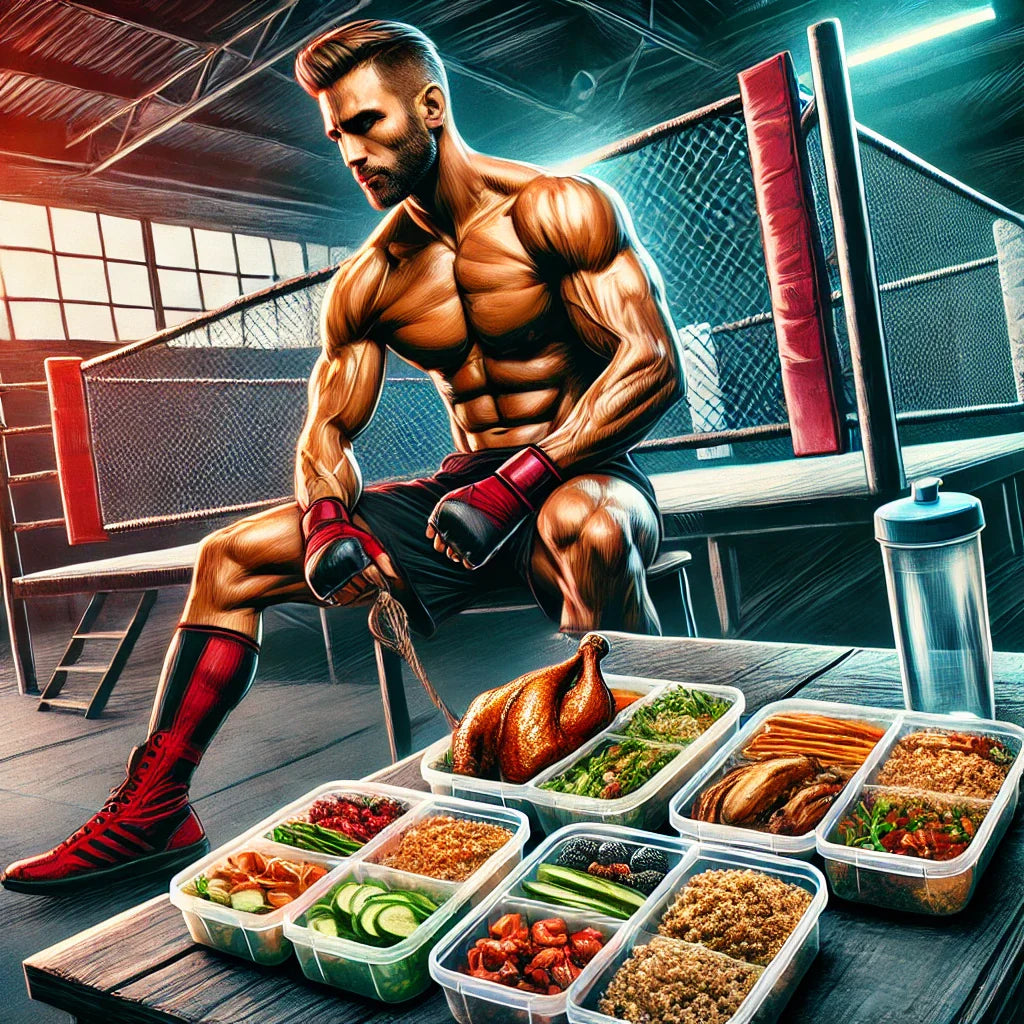Maintaining the right diet is crucial for a fighter’s performance, whether in Muay Thai, MMA, Boxing, or Jiu-Jitsu. Proper nutrition directly impacts endurance, strength, recovery, and even efficient weight cutting. In this blog, we explore how elite athletes structure their diets to maximize performance and maintain the ideal weight.
1️⃣ How Fighters Maintain Weight Before Fights
Fighters must stay within their weight category, but this is no easy task. Weight cutting, when done correctly, can enhance performance, but extreme methods can harm health and stamina inside the octagon.
Phases of a Fighter’s Diet:
- Strength & Endurance Phase (Off-Camp): Fighters consume more calories to build muscle and increase endurance. The diet is rich in carbs, proteins, and healthy fats.
- Fight Camp (8 Weeks Before Fight): Diet becomes stricter to shed fat while maintaining strength. Processed foods are reduced, and lean protein intake increases.
- Weight Cut (Fight Week): Fighters manipulate sodium and water intake to eliminate excess fluids and make weight.
🔹 Common Mistake: Many fighters over-rely on dehydration before weigh-ins, which can severely impact performance. The best strategy is gradual fat loss rather than extreme water loss.
2️⃣ Essential Foods for Fighters
Fighters need a balanced and strategic diet to fuel their training and aid post-fight recovery.
🔹 Proteins (Muscle Growth & Recovery)
- Chicken
- Fish (Salmon, Tilapia)
- Eggs
- Lean beef
- Whey Protein (as a supplement)
🔹 Carbohydrates (Training Energy)
- Brown rice
- Sweet potatoes
- Oats
- Quinoa
- Whole-wheat pasta
🔹 Healthy Fats (Endurance & Hormonal Health)
- Avocado
- Nuts & almonds
- Olive oil
- Natural peanut butter
- Chia & flax seeds
🔹 Vegetables & Fruits (Vitamins & Antioxidants)
- Broccoli
- Spinach
- Bananas
- Strawberries
- Oranges
3️⃣ Diet Before & After Fights
🥊 Pre-Fight Diet (Final 3 Days Before Fight):
- Increase in complex carbohydrates for energy.
- Avoid processed & high-sodium foods to prevent water retention.
- Constant hydration with electrolytes and water.
🥊 Post-Fight Diet (Fast Recovery):
- High protein intake for muscle repair.
- Anti-inflammatory foods like turmeric and ginger.
- Hydration with coconut water and electrolyte drinks to restore balance.
🔹 Common Mistake: Many fighters binge on fast food after a fight, slowing their recovery. The best approach is to gradually return to a balanced diet.
4️⃣ Sample Diets of Professional Fighters
📌 Israel Adesanya (MMA - Middleweight)
- Breakfast: Omelet with spinach & whole-wheat toast.
- Lunch: Grilled chicken with quinoa & broccoli.
- Dinner: Salmon with sweet potatoes.
📌 Buakaw Banchamek (Muay Thai - Lightweight)
- Breakfast: Rice with eggs & chicken.
- Lunch: Grilled fish with rice & vegetables.
- Dinner: Vegetable soup with lean meat.
📌 Khabib Nurmagomedov (MMA - Lightweight)
- Breakfast: Oatmeal with bananas & honey.
- Lunch: Red meat with sweet potatoes.
- Dinner: Lamb soup with brown rice.
🔹 Fun Fact: Many fighters avoid dairy and refined sugars as they cause inflammation and reduce performance.
Conclusion: The Role of Diet in a Fighter’s Performance
A well-planned diet provides energy for training, enhances recovery, and enables weight cutting without compromising performance. Professional fighters follow precise nutrition strategies to maintain peak physical condition throughout the season and perform at their best inside the cage.
If you train in Muay Thai, MMA, or any martial art, applying these nutritional principles can help you improve your own performance!

